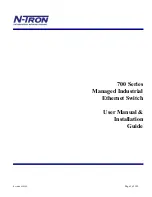
18
Catalyst 6509 Switch, Cisco 7606 Router, and Cisco 7609 Router with VPN Services Module Certification Note
OL-6334-01
Physical Security
Physical Security
The router is entirely encased by a thick steel chassis. Nine module slots are provided on the
Catalyst 6509 switch and the Cisco 7609 router; six module slots are provided on the Cisco 7606 router.
On-board LAN connectors and console connectors are provided on the supervisor engines, and the power
cable connection and a power switch are provided on the power supply of both models. The individual
modules that comprise the switch or the router may be removed to allow access to the internal
components of each module.
Any chassis slot that is not populated with a module must have a slot cover installed in order to operate
in a FIPS compliant mode. The slot covers are included with each chassis, and additional slot covers may
be ordered from Cisco. Use the procedure described here to apply tamper evidence labels to the network
modules and the service modules.
Note
Use the same procedure to apply tamper evidence labels to the slot covers.
After the router or the switch has been configured to meet FIPS 140-2 Level 2 requirements, the router
or the switch cannot be accessed without indicating signs of tampering. To seal the system with
serialized tamper-evidence labels, follow these steps:
Step 1
Remove any grease, dirt, or oil from the cover by using alcohol-based cleaning pads before applying the
tamper evidence labels. The chassis temperature should be above 10° C (50° F).
Step 2
Place labels on the chassis as shown in either
Figure 7
(Catalyst 6509 switch),
Figure 8
(Cisco 7606
router), or
Figure 9
(Cisco 7609 router).
a.
Fan tray—The tamper evidence label should be placed so that one half of the label adheres to the
front of the fan tray and the other half adheres to the left side of the chassis. Any attempt to remove
the fan tray will damage the tamper seal, which indicates tampering has occurred.
b.
Modules—For each Supervisor Engine 2, VPN Services Module, network module, or blank module
cover installed in the chassis, place a tamper evidence label so that one half of the label adheres to
the right side of the module and the other half adheres to the right side of the chassis. Place a second
tamper evidence label so that one half of the label adheres to the left side of the module and the other
half adheres to the left side of the chassis. Any attempt to remove the fan tray will damage the tamper
seal, which indicates tampering has occurred.
c.
Power supply—For each power supply or power supply blank cover installed in the chassis, place a
tamper evidence label so that one half of the label adheres to the front of the power supply or power
supply blank cover and the other half adheres to the chassis. Any attempt to remove the fan tray will
damage the tamper seal, which indicates tampering has occurred.
d.
Opacity shield—Four labels should be applied to the opacity shield (mounted on the right side of
the chassis) as follows:
•
Place one label so that one half of the label adheres to the top of the opacity shield and the other
half adheres to the chassis.
•
Place one label so that one half of the label adheres to the left side of the opacity shield and the
other half adheres to the chassis.











































